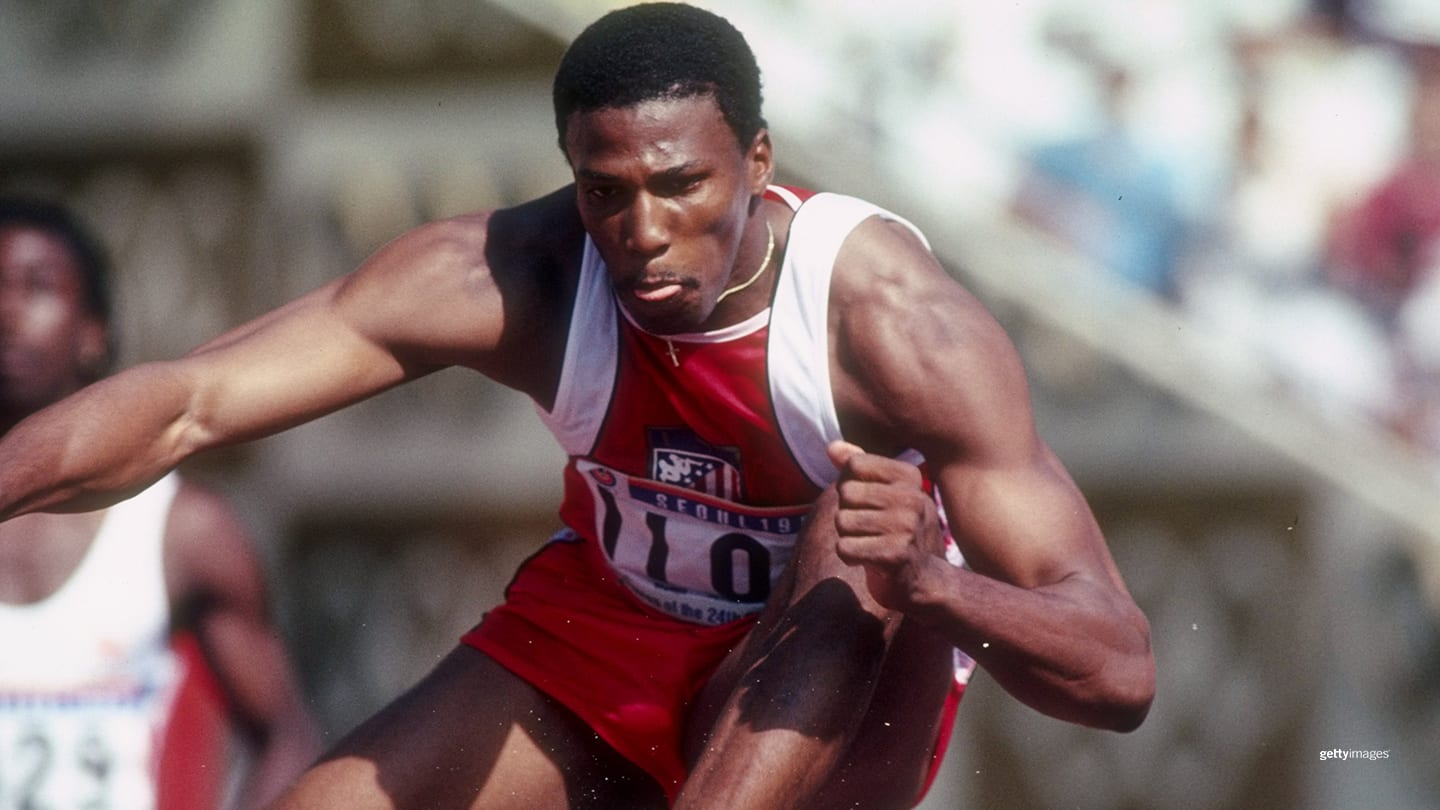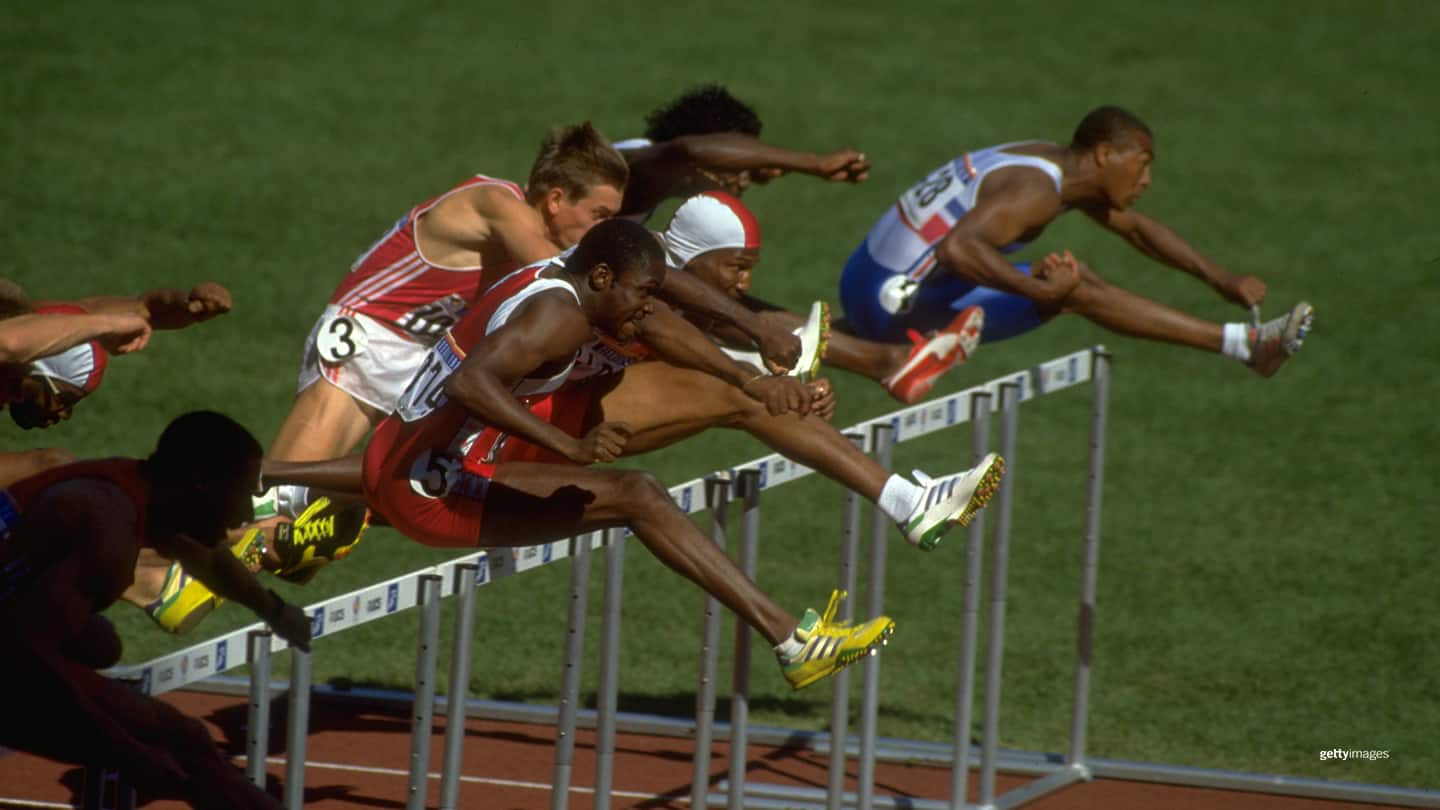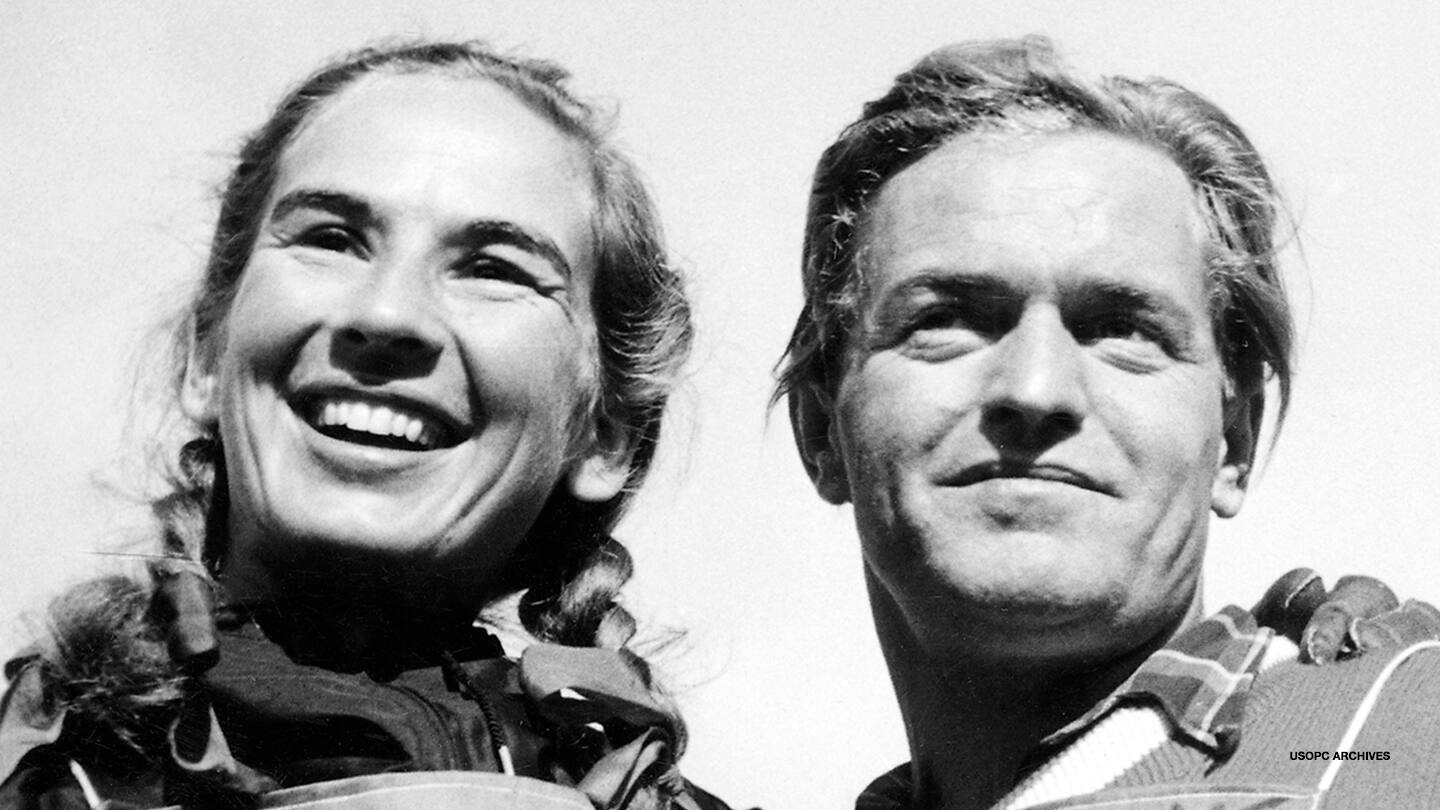
Hall Of Fame Inductee Roger Kingdom Cleared Every Hurdle On The Way To Olympic Stardom
by Bob Reinert

Roger Kingdom competes during the men's 110-meter hurdles final at the Olympic Games Seoul 1988 on Sept. 28, 1988 in Seoul, South Korea.
During his lengthy career, Roger Kingdom had an uncanny ability to clear hurdles — both literally and figuratively.
Kingdom overcame more than his share of obstacles to win a pair of Olympic gold medals, set the world record in the 110-meter hurdles and earn a Super Bowl ring.
In recognition of his many accomplishments, Kingdom will be inducted to the U.S. Olympic & Paralympic Hall of Fame, Class of 2022, in a ceremony June 24 at the U.S. Olympic & Paralympic Museum in Colorado Springs, Colorado. He and the late, great alpine skier Gretchen Fraser will enter the hall in the “Legends” category.
“The USOPC induction, to me, means a great deal because you spent most of your life chasing Olympic glory, and when you spend most of your life chasing the Olympic glory, for your accomplishments to be recognized as being something that was spectacular is amazing,” Kingdom said. “It’s amazing for them to now select you for this particular honor. I think it’s the highest honor that an amateur athlete or a track and field athlete can receive.”
Kingdom has been selected for other halls of fame, including USA Track and Field’s in 2005.
“Each one of them is exciting, because (of) the time frame that goes between them,” said the 59-year-old from Orlando. “It’s not like they all happen all at the same time.
“All of a sudden, you’re reminded, by getting selected into a hall of fame, of your accomplishments. Just when now people start to forget, it’s brought to the light again by this selection. That’s why each one of them is such an honor.”
Kingdom became only the second athlete to win consecutive Olympic 110 hurdles titles when he won in 1984 in Los Angeles and 1988 in Seoul. Neither came without adversity. In 1984, he had pulled a hamstring just prior to the Opening Ceremony.
“I didn’t think that I would have a chance to run,” Kingdom recalled. “And I kept it hidden because I didn’t want them to put the alternate, Milan Stewart, in there in my place because I was a young guy and a newcomer, and nobody knew anything about me.
“I managed to overcome all of those obstacles, run the race and won every race that I ran (at the Olympics) that year.”
Kingdom tied the Olympic record in the semifinals and broke the record in the finals to take home the gold medal.
“I tell everybody there was a blessing on my life in that race because a presence touched me midway in that race that I never, ever felt again,” Kingdom said. “That’s when I caught Greg (Foster, the silver medalist also from Team USA).”

Roger Kingdom (Lane 4) competes during the men's 110-meter hurdles final at the Olympic Games Seoul 1988 on Sept. 28, 1988 in Seoul, South Korea.
Kingdom suffered another hamstring injury in between the two Olympics but got healthy and prepared to show the world that 1984 was no fluke.
“They didn’t give me any credit for actually winning,” said Kingdom of the 1984 performance. “All I did was just train, train, train, train, train, and had a completely undefeated year that year. It was one of the best seasons I ever had in my life.”
At the Olympic Games Seoul 1988, he became the first hurdler to run under 13 seconds at the Olympics as he added that second gold medal. Then in 1989, he set the world record of 12.92 seconds at Zurich, Switzerland.
“People could see that not only were you a good hurdler, you were a great hurdler, and now the best ever,” Kingdom said. “I was the best ever in that race for four years.”
Favored to win the event again at the 1991 world championships, he suffered a serious knee injury and was told by some that he might not walk again. He proved them wrong one more time.
“Not only did I run again, but I won the ’95 USA championship and made my very first outdoor world championships team to go to Gothenburg, Sweden,” Kingdom said. “That was truly a blessing for me.”
In Gothenburg, Kingdom won an improbable bronze medal. After his career ended four years later, he returned to the University of Pittsburgh to finish his bachelor’s degree.
“That was the greatest thing that ever happened to me,” said Kingdom, “above the medals and all of that kind of stuff.”
Kingdom had played two seasons of football at Pitt in the early 1980s before turning his focus to the hurdles. After graduation, he interned and volunteered with the Cleveland Browns, catching the eye of offensive coordinator Bruce Arians.
A 10-year stint coaching track and field and cross country at California University (Pennsylvania) followed. When Arians became head coach of the Arizona Cardinals, he recruited Kingdom to become his strength and conditioning coach. After Arians took over the Tampa Bay Buccaneers, he gave Kingdom a similar position.
When Tampa Bay won Super Bowl LV, Kingdom had his championship ring.
“The final highlight of all the highlights I’ve had in my career … was competing in the Super Bowl and actually winning a Super Bowl ring,” Kingdom said. “No, the Super Bowl ring does not outshine the Olympic gold medals, but it stands right there with (them).”
Kingdom resigned from the Tampa Bay position in March, but he’s now seeking new ventures. Meanwhile, he’s looking forward to the U.S. Olympic & Paralympic Hall of Fame induction ceremony.
“Look at who you’re going in with,” said Kingdom, mentioning the likes of Billie Jean King, Michael Phelps and Lindsey Vonn. “I’m really humbled knowing that I got selected to go in with this quality of athletes from the legacy of the Olympic Games. It’s quite an amazing feat.”

(L-R) Gretchen Fraser and Edy Reinalter (Team Switzerland) pose for a photo together after winning gold in the men's and women's slalom finals, respectively, at the Olympic Winter Games St. Moritz 1948 in St. Moritz, Switzerland.
After World War II, skiing became a global sport, and Gretchen (Kunigk) Fraser was its first American star.
In the debut of alpine skiing’s modern events at the Olympic Winter Games St. Moritz 1948 in Switzerland, Fraser captured the gold medal in slalom and the silver medal in the alpine combined. Just days before her 29th birthday, she became the first American skier — man or woman — to win an Olympic ski medal.
Fraser had also been named to the 1940 U.S. Olympic Team, but those Games were cancelled due to World War II.
Among her many ski race victories, Fraser won a pair of national titles. In 1952, she served on the Olympic Selection Committee and was the women’s team manager for the Games in Oslo, Norway.
Away from competitions, Fraser also served as the stand-in skier for champion skater turned movie star Sonja Henie in the movies “Thin Ice” and “Sun Valley Serenade.”
The daughter of immigrants from Germany and Norway, Fraser was born in 1919 in Tacoma, Washington, and began ski racing on Mount Rainier in 1936, winning several novice races. She was inducted into what’s now the U.S. Ski and Snowboard Hall of Fame in 1960.
Fraser died February 17, 1994, at age 75, a little over a month after the death of her husband of 54 years, Don Fraser, a member of the 1936 U.S. ski team.
Bob Reinert spent 17 years writing sports for The Boston Globe. He also served as a sports information director at Saint Anselm College and Phillips Exeter Academy. He is a contributor to TeamUSA.org on behalf of Red Line Editorial, Inc.